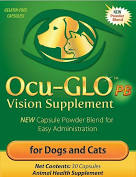Today we will talk about many people’s fear when diagnosed with Canine Diabetes. Will my pup go blind? Statistically, you’ll read that 75% of all dogs diagnosed with Diabetes will develop diabetic cataracts and go blind within the first 9 months of being diagnosed. I have to believe that this statistic was created before home testing became much more prevalent. This is a topic that once again makes a strong case for home testing your Diabetic dog. When we explore further, you’ll understand why.
You’ll notice that I clarified Diabetic Cataracts. All cataracts aren’t created equally here. There are age related cataracts for dogs just like there are for humans. The cataracts that we are concerned with are not the age related ones; we care about the cataracts that are a direct result of diabetes. When BG (Blood Glucose) runs high, excess sugars will enter the eye and attach to the lens. These sugars will build up on the lens becoming opaque and causing the lens to become brittle. This is the cause of diabetic cataracts.
Can you prevent this process? You certainly have a much better chance of doing so if you are testing at home and can keep your pup’s BG (Blood Glucose) as close to 200 as possible. That’s a very ambitious goal, but one that we see accomplished fairly often in our Facebook Group ( Canine Diabetes Support and Information). By keeping BG (Blood Glucose) under control you can certainly do your best to keep the cataracts at bay for as long as possible and perhaps avoiding them all together. If possible, I’d take your pup to see a veterinary ophthalmologist as soon as you can after diagnosis to get a baseline set. There are some other preventive measures that you can take as well.

Your biggest tool to avoid cataracts in your “sugar baby” is your meter. Testing BG (Blood Glucose) at home will give you the best data possible to keep the serious complications of this disease (Pancreatitis, DKA) from escalating to the point of vet intervention. There are also some very good products on the market that will help in keeping Diabetic Cataracts from developing quickly. One product is called OcuGlo and comes in both capsule and powder form.

This is for general eye health and is recommended by many veterinary ophthalmologists for their diabetic patients. I would use the powder form as the capsules are quite large and contain oil. If your pup is susceptible to pancreatitis, I’d definitely use the powder. The other product that our group’s ophthalmologist recommends is OptixCare in the pink box. When he has a new patient, these are the two things that he recommends right away. Both can be found on line.
If your pup develops cataracts, there is a surgery that can be performed to replace the lens with a synthetic version and your pup will never have diabetic cataracts again as the synthetic lens can’t absorb glucose. The surgery is expensive and most pet insurances will cover it or at least a large portion of it. If you don’t have pet insurance for your pup, then trying to do your best to prevent the cataract development is a good mission to be on.
In the event that none of the above mentioned options are available to you, please know that dogs acclimate very well to being blind for the most part. Vision is the last of their 3 main senses to develop as puppies, so when vision goes, the other two (hearing and smell) take over. They will learn to navigate their life just fine. There is a very good Facebook group for blind dogs that can help to guide you and your pup through the process.
While as humans, we fear blindness; our dogs seem to transition fairly well and can live long and happy lives as blind diabetics. I don’t know if you’ve noticed a pattern through many of these posts, but if you’ve missed it, I’ll spell it out. Home testing is the key to managing this disease and keeping your dog as healthy and happy as he/she can be. Canine Diabetes is not a death sentence and with proper management, is one of the better diseases that your pup can have.
If you notice that some text in these posts is a different color (blue or red), you can click on that word and it will take you to the product or group that is being mentioned. If you have any thoughts or ideas for topics that you’d like to see covered here, please feel free to comment below or send me an email at NancyForPetTest@pharmasupply.com. As always, please “like” this blog post or any of the others that have helped you or just refreshed your memory. Look for new posts every Monday, Wednesday and Friday!
Until next time…

